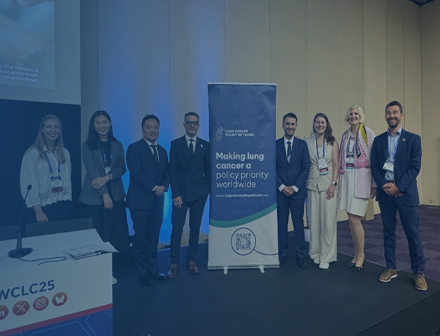We speak to Lauren Pretorius, CEO of Campaigning for Cancer, in South Africa
What led you to work in the field of lung cancer?
While I work as a patient advocate for all cancers, lung cancer is one of the most prevalent and deadly in our country. A cancer diagnosis is a death sentence for many in South Africa, and I am working tirelessly to ensure all patients have access to the care and innovations they need to survive.
What does an average work day look like for you?
My team and I are the first point of call for patients who have just heard the worst news they could hear. They are receiving a cancer diagnosis, and are then given the double bad news that they cannot access treatment. My team and I work to change this.
What is working well in South Africa, and what could be improved?
We have no formal policies on lung cancer control; this is one of the primary issues we are working on. We need to change political will to ensure proper resources are allocated to lung cancer control and care.
What motivated you to join the Lung Cancer Policy Network?
I wanted to gain a greater understanding of best-practice care provision for lung cancer patients to help in my advocacy efforts. Joining the Network has allowed me to be part of a global call for action. I get to work with other advocates who are working tirelessly to advocate for citizens from lower-resource countries like my own.
What would you like to see from the Network as it develops?
The Network’s work is so needed, because many lung cancer patients have limited access to care, resulting in poor survival rates. I want to see the Network generate more solutions for access to high-quality care for patients from every part of the globe.
What changes would you like to see in lung cancer care on a global level?
Almost two thirds of lung cancer patients live in under-resourced settings and healthcare systems. I want to see policy incorporate practical scenarios and implementation plans that take these issues into account. There is a need for political will amongst actors, and a continuous search for innovation and value-based healthcare for better outcomes for patients. I want to ensure that all patients have access to high-quality lung cancer care, and that they can access this on their own terms in a setting that reflects the local culture.
What recent research have you found the most interesting or exciting?
Any innovation that leads to better quality of life for patients and their families is exciting to me. Quality of life should be at the core of all innovations.
Outside of work, what do you spend your time doing?
I enjoy reading, painting and travelling.
The Lung Cancer Policy Network brings together a unique mix of experts in lung cancer from around the world, united in their passion to eliminate lung cancer as a cause of death.
We regularly share profiles of our members so that you can find out more about what led them to work in lung cancer and what changes they would like to see in lung cancer prevention and care on a global level.
Recent news
Blog

Insights from WCLC 2025
At the World Conference on Lung Cancer in Barcelona, the Network hosted a very well-attended panel discussion focusing on the latest developments in lung cancer policy.
Case study

The screening programme for lung cancer in the Canadian province of British Columbia
We explore how a regional screening programme has been established throughout British Columbia.
News

Event to address lung cancer screening implementation in Central and Eastern Europe
On 16 September, the Network and the Croatian National Lung Cancer Screening Program will be hosting an in-person event.
